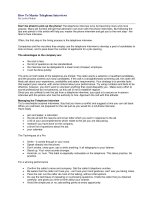How to succeed at interview
Bạn đang xem bản rút gọn của tài liệu. Xem và tải ngay bản đầy đủ của tài liệu tại đây (98.65 KB, 4 trang )
How to Succeed at Interview
The purpose of an interview is for an employer to gather as much information as possible
about a prospective employee. They need to be certain that you are going to fit comfortably
and effectively into their team and that you have something to offer their organisation.
The interview will allow you to find out everything you need to know about the firm and the
position. You need to be sure that this is the right role for you.
1. Preparation
Doing your homework
You will be fully briefed by your consultant before your interview, but you also need to do
some of your own preparation. Take a look at the firm's website, ask for their corporate
brochure or annual report, and read the business press for any articles about them. If you're
knowledgeable about and interested in the firm, you'll come across as proactive and
committed.
Re-read your CV
Make sure you read your own CV carefully before any interview. Your interviewer is likely to
use your CV as a guide when asking you questions. If you haven't stayed in one job for long,
or there are some gaps in your CV, make sure you can give positive reasons for this. Think
about the skills you've included in your CV - based on this, what will you actually bring to the
firm? Consider the responsibilities and achievements you have listed under each job with
particular emphasis on the past 3-5 years. Can you elaborate on your achievements?
The job description
Make sure you are fully familiar with the specification of the job for which you are interviewing.
What key skills and experience are they looking for? Can you draw direct examples from your
own CV? Can you describe recent achievements which are relevant to the new job?
Think of examples from your own experience which demonstrate your personal competencies
as they might relate to this job.
What to wear
Dress smartly and professionally. Some firms have 'dress down' policies but it's usually safer
to wear a suit. If you're not sure, talk to your consultant.
Plan your journey
Allow plenty of time for the journey and aim to arrive 10 minutes early. Remember to get clear
directions and to plan your route in advance. If you are driving check out where you can park
and how close it is from the car park to the firm’s offices. Remember to take change for
parking meters. If you're delayed, call your consultant immediately so they can phone the
client on your behalf. Don't forget to turn off your mobile phone when you arrive.
2. During the interview
Some helpful tips
If you are nervous, take a few deep breaths before you go in
Give a firm handshake
Be confident in yourself
Maintain eye contact and sit up straight
Smile - this shows you are friendly
Respond honestly to questions, making your answers concise and relevant
Think carefully before answering
Ask questions if there's anything you don't understand
Listen to the interviewer and show interest
Relate your own experience and skills to the position
Don't interrupt the interviewer
Avoid folding your arms or fidgeting in your seat
Questions you might be asked
Tell me about yourself? Give a short summary of your qualifications, career history,
skills and what you will bring to the role.
Why do you want to leave your current position? Don't be negative and don't criticise
former employers. Focus on positive reasons such as a new challenge, more
responsibility, or the need for a change if you've been in your current role a long time.
What do you enjoy about your current job? Try to focus on things that will be part of
the job you're applying for.
Would you explain your current role? Describe how you fit into your department, your
reporting lines, who you interact with and your key responsibilities.
What have been your main achievements so far? Think about recent work
achievements, such as projects you've been involved with. What were the results,
how did they impact the business?
What are your strengths? A very common question. Think about three or four of your
main strengths and how they would benefit your new employer. Examples include
technical proficiency, flexibility and positive attitude. You may also be asked about
weaknesses. A weakness is not necessarily a negative, particularly if you can explain
what you do to overcome it.
Have you ever come across a difficult situation at work and how did you handle it?
Make sure it's a work-based problem that didn't originate with you.
Other questions to prepare for
How would your friends/colleagues describe you?
Where do you see yourself in five years?
How do you cope when your work is criticised?
Do you like to work in a team or by yourself, and why?
What are you looking for in a firm?
What can you bring to this organisation?
How do you work under pressure, and how do you deal with pressure?
How would you react if you were asked to work late at short notice?
When you're not busy, what do you do?
Why should you get this job over other candidates?
Competency Based Questions
Your interviewer might ask you to give examples of how you have dealt with certain work-
related scenarios in the past. This type of questioning is used to explore your capability in a
number of different behavioural or situational competencies. If asked these types of question
you give you should consider the situation, the action you took, and the effect it had. Here are
some common examples:
1. Planning and Organising
Tell me about a successful activity or event that you planned recently. Talk me through
the background. How did you approach it? What were your first steps? What specifically
did you do to ensure its success? What did you learn about planning as a result of this
exercise?
2. Resilience and Tenacity
Describe a situation in which you had to work under pressure. What was the cause of the
pressure? How did you feel and react? What impact did this have on your work?
3. Teamwork
Tell us about some of the best teams you have worked with? What specifically made
them good teams? What part did you play in their success? Can you give some
examples of when they really performed well? What learning from these teams do you
continue to apply?
4. Communication
Tell us about a time recently when you have had to communicate something that was
difficult or complicated to get across? What was the message? Who were you
communicating to? How did you go about it? What was the outcome?
5. Decision making
Tell us about a time when you have had to make a difficult decision? What happened?
How did you communicate the decision? How did you display urgency in the process?
6. Leadership
Describe a situation where you had to manage an individual or team through a period of
change? How did you deal with this? What actions did you take to ensure a smooth
transition during this period? What was the outcome of this? What challenges did you
face during this period? How did you manage these?
Questions for you to ask
Having a few well thought out questions shows you are interested and that you are taking the
interview seriously. It's also your chance to assess the firm. Even if the interviewer has
already answered most of them, prepare a few to ask at the end. Here are some of the
questions you could ask:
How does the department fit into the firm?
What are the personalities of the team or manager?
What sort of person is the team looking for?
How long was the last post-holder in the position?
Are any internal candidates interested in the position?
What's the firm’s culture?
Do you run an induction programme?
Why does the interviewer think it's a good firm to work for?
How does the interviewer feel that your skill set meets the requirements of the role?
Unless you're specifically asked, don't talk about salary at a first interview.
Closing
Thank the interviewer and be positive, stating that you have enjoyed the interview and that
you would be delighted to be invited back. Ask what the next stage of the interview process
will be.
Remember to phone your consultant with feedback as soon as you can.









